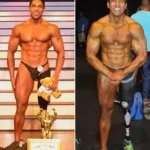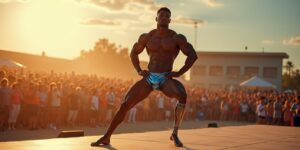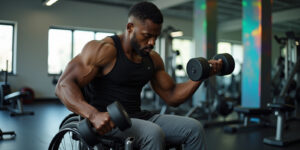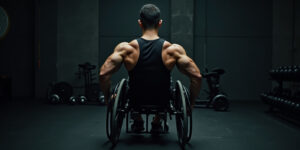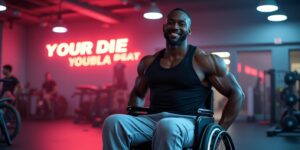People with disabilities are often overlooked when it comes to physical activity. Unfortunately, some people may feel discouraged from pursuing their fitness goals because of the perceived challenges that come with having a disability. However, disabled individuals who are bodybuilders and athletes are proving every day that they can be just as fit and healthy as non-disabled individuals.
In this blog post, we’ll discuss nutrition guidelines for disabled bodybuilders and some diet tips that can help maximize performance and recovery. But before we begin, let’s understand what nutrients disabled bodybuilders need to be aware of.
Understanding Nutrition Needs for Disabled Bodybuilders
For bodybuilders with disabilities, nutrition is vital to reaching optimal health and bodybuilding goals. Eating balanced meals consisting of protein, carbohydrates, and fat is essential to support training and body composition goals. Good nutrition should take precedence over exercise when it comes to reaching bodybuilding goals, as this will help you reach your desired physique without overexertion.
To ensure you’re getting enough calories, aim to eat 3-5 servings of protein-rich foods, such as lean red meat, poultry, fish, legumes, eggs, and whey protein powder. Carbohydrates such as fruits, vegetables, and whole grain pasta are also important sources of vitamins and minerals. A healthy fat intake can come from Kerrygold butter, olive oil, avocados, nuts, and seeds.
Additionally, aim to consume the recommended amounts of vitamin D3 from sunlight or supplements if you don’t have access to adequate sunlight exposure. Consuming the right amount of protein, carbohydrate, and fat will also help you develop muscle mass and improve your overall health.

Essential Nutrients for Optimal Performance
Bodybuilding is a sport that requires proper nutrition to support optimal performance, and this is no different for disabled bodybuilders. Essential nutrients are nutrients that the body cannot produce on its own and must be obtained through diet or supplements.
- Protein: Protein is a crucial nutrient for building and repairing muscles. Disabled bodybuilders require an adequate amount of protein to support muscle growth, repair and recovery. The recommended daily intake of protein for disabled bodybuilders is about 1.2-1.7g per kilogram of body weight per day. Good sources of protein include lean meats, fish, eggs, dairy products, legumes, and protein supplements.
- Carbohydrates: Carbohydrates are the primary source of energy for the body. Disabled bodybuilders require an adequate amount of carbohydrates to support their energy needs during training and competitions. The recommended daily intake of carbohydrates for disabled bodybuilders is about 5-8g per kilogram of body weight per day. Good sources of carbohydrates include fruits, vegetables, whole grains, and starchy vegetables such as potatoes.
- Fats: Fats are important for providing the body with energy, supporting brain function, and aiding in the absorption of fat-soluble vitamins. Disabled bodybuilders require an adequate amount of healthy fats in their diet. Good sources of healthy fats include fatty fish, nuts, seeds, avocados, and olive oil.
- Vitamins and Minerals: Vitamins and minerals are essential for many functions in the body, including supporting the immune system, bone health, and energy production. Disabled bodybuilders may have a higher risk of nutrient deficiencies due to their disability, medication use, or dietary restrictions. Therefore, it is important to consume a variety of nutrient-dense foods or take supplements to meet daily requirements.
- Water: Staying hydrated is crucial for disabled bodybuilders to maintain optimal performance. Water is essential for regulating body temperature, lubricating joints, and transporting nutrients throughout the body. Disabled bodybuilders should aim to drink at least 8-10 cups of water per day, or more if they are training or competing.
Disabled bodybuilders require an adequate intake of essential nutrients to support optimal performance. This includes adequate amounts of protein, carbohydrates, fats, vitamins, minerals, and water. A balanced and varied diet, along with proper hydration, can help ensure that disabled bodybuilders are meeting their nutritional needs. Consultation with a registered dietitian may be helpful in developing a personalized nutrition plan.
Adapting Diets to Meet Unique Needs
A healthy bodybuilding diet should consist of whole organic foods and supplements taken before, during, and after workouts. This is important for disabled bodybuilders as these may influence cravings, blood sugar, mood, and performance. Meal timing and frequency are important considerations for disabled bodybuilders as these can affect appetite, energy levels, and weight management.
Bodybuilding requires a rigorous and demanding diet to fuel muscle growth and maintain a lean physique. However, for disabled bodybuilders, adapting their diets to meet their unique needs can be challenging.
- Consult a healthcare professional: Disabled bodybuilders should consult with a healthcare professional, such as a registered dietitian or a physician, to assess their nutritional needs. The healthcare professional will consider the bodybuilder’s disability, metabolic rate, medical history, and other factors to determine the appropriate diet for them.
- Adjust macro and micronutrient ratios: Disabled bodybuilders may need to adjust the ratios of macronutrients (protein, carbohydrates, and fat) to meet their unique needs. For example, some disabilities may require a higher intake of protein to support muscle growth, while others may need to limit their intake of certain types of carbohydrates. Additionally, micronutrient needs may be different for disabled bodybuilders, and a healthcare professional can help determine appropriate levels.
- Consider supplements: Disabled bodybuilders may benefit from the use of supplements to support their nutrition. For example, a disabled bodybuilder with limited mobility may need to take vitamin D supplements to ensure adequate bone health. Creatine supplements can also help improve muscle strength and endurance in disabled bodybuilders.
- Optimize meal timing: Meal timing is an essential component of a bodybuilder’s diet. For disabled bodybuilders, it may be necessary to adjust meal timing to fit their lifestyle and disability. For example, a bodybuilder with a spinal cord injury may need to eat more frequent, smaller meals to maintain stable blood sugar levels throughout the day.
- Adjust portion sizes: Disabled bodybuilders may need to adjust portion sizes to meet their unique needs. For example, a bodybuilder with a digestive disorder may need to eat smaller, more frequent meals to prevent digestive issues.
- Monitor hydration: Disabled bodybuilders should monitor their hydration levels closely to ensure they are adequately hydrated. Some disabilities can cause dehydration more easily, such as those with autonomic dysfunction, and may require more frequent water intake or electrolyte supplementation.
Adapting diets for disabled bodybuilders requires careful consideration of individual needs and goals. Consulting with a healthcare professional, adjusting macronutrient and micronutrient ratios, supplementing where necessary, optimizing meal timing and portion sizes, and monitoring hydration are all strategies that can be used to support a disabled bodybuilder’s nutrition needs.

Macronutrients needs for disabled bodybuilders
For disabled bodybuilders, nutrition is essential to create and maintain a lean, muscular physique. To support muscle growth and recovery, it’s important to consume the proper amounts of carbohydrates, protein, and fat. Additionally, it’s vital to eat frequent meals (5-7 per day) that provide adequate calories for muscle growth and repair. Eating a high-calory diet can help provide the energy needed for training and bodybuilding.
It’s vital to ensure that the diet is clean and contains enough macronutrients to support training goals. To create a healthy bodybuilding nutrition plan for disabled bodybuilders, it’s essential to consult with a nutritionist or qualified healthcare provider. They can help develop a balanced meal plan based on your personal goals and needs.
What food should disabled bodybuilders avoid?
As a disabled bodybuilder, it is important to maintain a healthy and balanced diet to support your fitness goals and overall well-being. However, there are certain foods that disabled bodybuilders may want to avoid to prevent negative health effects. Here are some examples:
- Processed foods: Processed foods, such as fast food, frozen dinners, and packaged snacks, are often high in salt, sugar, and unhealthy fats. These foods can contribute to inflammation, weight gain, and other health issues, which can be particularly detrimental for disabled individuals who may already be dealing with chronic pain or mobility issues.
- Sugary drinks: Sugary drinks like soda, energy drinks, and sports drinks are high in calories and sugar, which can contribute to weight gain, blood sugar imbalances, and other health issues. These drinks also provide little nutritional value, which means they may not provide the energy and nutrients that disabled bodybuilders need to support their fitness goals.
- Trans fats: Trans fats are a type of unhealthy fat that are commonly found in processed foods, fried foods, and baked goods. These fats can contribute to inflammation, heart disease, and other health problems, which can be particularly problematic for disabled individuals who may already be dealing with a range of health issues.
- High-sodium foods: Foods that are high in sodium, such as processed meats, canned soups, and fast food, can contribute to high blood pressure and other health problems. This can be particularly problematic for disabled individuals who may already be dealing with circulatory issues or other health concerns.
- Alcohol: While it’s important to stay hydrated, disabled bodybuilders may want to avoid consuming alcohol, as it can interfere with sleep, dehydrate the body, and contribute to weight gain. Additionally, alcohol can interfere with the body’s ability to build and repair muscle, which can be particularly problematic for disabled individuals who may be working to build strength and improve their physical function.
Supplements that can help with muscle growth and recovery
– Creatine is a supplement that bodybuilders use to increase lean mass and muscular power output.
– Protein shakes are popular among bodybuilders in both the off-season and pre-contest phase. Protein shakes can help bodybuilders gain muscle faster while also providing essential amino acids and BCAAs for muscle growth and recovery.
– Amino acids, such as leucine, areoleucine, and lysine, are important for muscle growth. They can be found in protein shakes or supplements such as whey protein and creatine.
Let’s Sum Up
Bodybuilding has always been a challenge for the disabled. However, with the right nutrition and exercise habits, bodybuilding can be a viable training option for people with disabilities. It is essential to understand your body’s specific nutritional and medical needs before commencing any bodybuilding routine. Then, adapt your diet to meet these specific needs while exercising regularly to gain muscle mass and strength. Also, consider supplementing your diet with protein shakes and other supplements that can help you gain muscle mass and strength faster.

